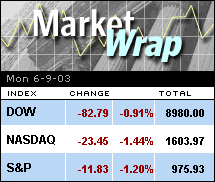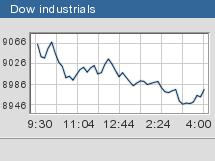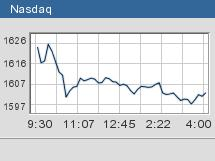NEW YORK (CNN/Money) -
U.S. stocks sold off Monday, as negative events at Freddie Mac and a warning from Motorola dented investors' enthusiasm for the recent rally and helped to encourage profit-taking.

The Nasdaq composite logged the biggest loss, shedding 1.4 percent. The S&P 500 index lost about 1.2 percent, while the Dow Jones industrial average wasn't far behind with a loss of about 0.9 percent. The Dow's loss pulled it down below the 9,000 level, which it managed to hold above for three straight days last week.
"It's consolidation, but the consolidation doesn't look good because the buyers are stepping away from the market," said Bill Roe, portfolio manager at Melhado, Flynn & Associates. "It's been disappointing, but the trend is still upward. ... I'm waiting to see what's going to happen in the next day or two."
News that Freddie Mac had fired its president and chief operating officer sent stocks into a tumble from the outset of trading Monday. A warning for the second quarter from Motorola secured investors' desire to take profits, as the negativity from both events held back buyers Monday after two straight weeks of stock market gains.

Investors used the news from Freddie Mac and Motorola as reason to regroup Monday, after all three major indexes saw gains of more than 2 percent last week.
"The market is just enduring a little bit of a correction, and people have been looking for it for a while," said Bryan Piskorowski, market analyst at Prudential Financial.
Tuesday could be more of the same, traders said. With little in the way of economic news, investors may sit on the sidelines once again, watching how the Freddie Mac executive shakeup plays out.
A trigger for selling Tuesday might be a report by a court-appointed examiner released late Monday alleging that bankrupt WorldCom created a special set of financial reports masking its true operating results.
Meanwhile, some investors likely will look for signs in the Federal Reserve Board's Beige Book of where the economy, and interest rates, are heading. The Beige Book, due to be released at 2 p.m. ET Tuesday, is essentially a snapshot of where the economy stands in the agency's 12 districts around the nation � and sometimes provides an indication of the Fed's next move.
Freddie Mac, Motorola hit hard
Shares of mortgage lender Freddie Mac tumbled 16 percent after the firm said it had fired its president and chief operating officer for not fully cooperating with the counsel to its audit committee while it was reviewing the company's past financial records. The company's chief financial offer also resigned.
In addition, Rep. Ed Markey, a Massachusetts Democrat, called for a congressional hearing into Freddie Mac's accounting and the firing of the executives, Reuters reported.

Other mortgage lenders fell in sympathy, with Fremont General losing 5.2 percent, New Century Financial slipping 6.5 percent, and Federal National Mortgage dipping 4.8 percent.
A warning from Motorola added to the pressure. Shares of the wireless phone maker fell 2.4 percent after it said its earnings and revenue for the second quarter would miss Wall Street forecasts.
The report pushed other telecoms lower. Qwest fell more 4.6 percent, Sprint dipped 3.3 percent, and Qualcomm lost 1 percent.
Dollar shows weakness
The dollar fell versus the euro, which rallied after the British government said it won't immediately push to adopt Europe's common currency but said it would take another look in 2004. The dollar also lost ground against the yen.
Investors have watched with concern in recent months as the dollar lost value against the euro and the yen. There have been mixed statements by members of the Bush administration on their level of concern over a weak dollar.
But President Bush reiterated to reporters Monday that the government supports a strong dollar, Reuters reported.
In other corporate news, shares of information security company Veridian rose 26.1 percent after defense contractor General Dynamics said it would buy the company for $1.5 billion cash, including assumed debt.
The news comes on the heels of an unsolicited bid Friday by business software maker Oracle to buy PeopleSoft for $5.1 billion, in what many saw as an attempt to derail PeopleSoft's proposed purchase of J.D. Edwards, announced earlier in the week.
PeopleSoft CEO Craig Conway said Saturday he couldn't imagine any price, or combination of price and other conditions, that would encourage him to recommend Oracle's offer to shareholders.
On a conference call from a customer conference in Denver Monday, J.D. Edwards CEO Robert Dutkowsky said Oracle's bid brings up antitrust issues and would require months of investigation by regulators.
Deutsche Bank raised its price target on SAP, bumping its shares 3 percent higher, saying that the turbulence over the Oracle-PeopleSoft debate could be helpful for the software company.
Market breadth was strongly negative. On the New York Stock Exchange, 1.3 billion issues changed hands, while about 2.8 billion stocks traded on the Nasdaq.
European markets closed the day mostly lower. Asian stocks finished higher overnight.
Treasury prices rallied, with the 10-year note up 22/32 of a point in price to yield 3.27.
Light sweet crude oil futures rose 17 cents to $31.45 a barrel in New York, where gold slipped $1.90 to $362.60 an ounce.

|

